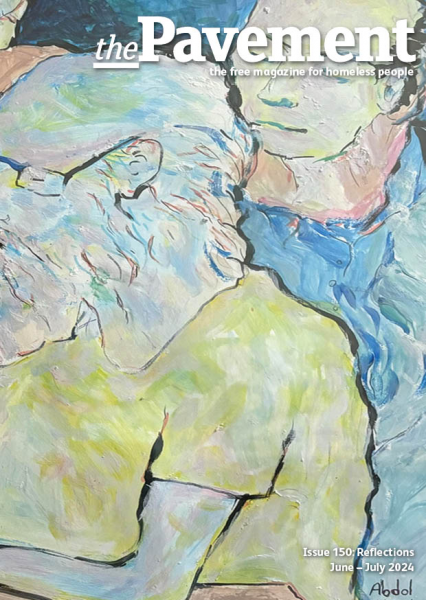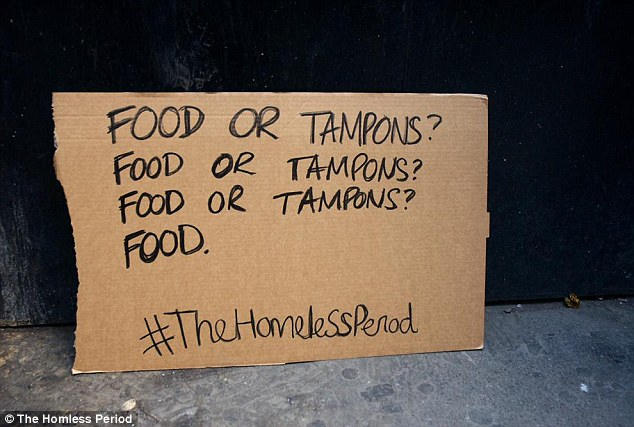
Established 2005 Registered Charity No. 1110656
Scottish Charity Register No. SC043760
DONATE
RECENT TWEETS
Two new campaigns have been launched in the UK with the aim of providing free sanitary products to homeless women.
Hayley Smith and Dermot McNamara established FlowAid early last month after discovering the lack of sanitary care or products available to homeless women. While some products are available at homeless shelters, supplies are often limited and run out quickly. And even if homeless women want to buy sanitary products (a choice which may mean forgoing food), it can be difficult to find cheap tampons or sanitary pads, thanks in no small part to the five per cent luxury tax.
“To think that condoms are available from several outlets for free, and sanitary ware is only accessible for those who can afford it is atrocious and slightly perverse. Women cannot help having periods. It is not a choice we have,” says Hayley Smith, managing director of Boxed Out PR agency.
Her co-founder, young entrepreneur Dermot McNamara, adds that homeless women currently have no choice but to simply deal with their periods by asking other women for sanitary products or using toilet paper. In some instances, however, this lack of access to sanitary care has led to an increase in criminal activity, including shoplifting and mugging. “Getting caught is bad enough, but getting caught stealing towels and tampons is humiliating,” says Dermot.
More concerning however is that without sanitary products, homeless women are at risk of developing health and hygiene problems. “Bad period hygiene can lead to health issues such as yeast infections and thrush. And antibiotics and creams are just as difficult to obtain,” says Dermot.
“It’s utterly atrocious that there isn’t any Government support for these women.”
FlowAid has already attracted a number of public figures, such as athlete Rachel Christie, Gogglebox’s George Gilby and award-winning æsthetics doctor Vincent Wong all pledging their support. The Big Issue and Women’s Refuge have also come on board. Hayley and Dermot are encouraging those who want to contribute to FlowAid to donate directly, organise fundraisers and petitions local MPs. Businesses can also help by collecting sanitary products by placing boxes in offices and receptions. All donations will go directly to women on the street or to homeless shelters.
Another campaign, the Homeless Period, has joined the cause, calling for the government to give homeless shelters an allowance to buy sanitary ware, in the same way they do for condoms. So far, almost 100,000 people have signed its petition.
Nicole O’Connor, who was previously homeless, told The Pavement: “When that monthly period starts you could even be on the street. I have been caught out a few times – realisation comes with that familiar warm ‘oops’. Now options are more limited than ever. Public toilet or shop toilet? Will I be able to wash my underwear? Do I have a spare clean pair? Have I got tampons or will I have to use toilet roll?
“I also developed toxic shock syndrome after using a tampon and forgetting about it for eight days, and was hospitalised for three days. Had I had the chance to shower or wash once a day, I might just have had the presence of mind to remove the item that was slowly poisoning me.”
In Glasgow, the Drumchapel Foodbank has launched a fundraising campaign to help provide necessary female sanitary items to women in the local and wider community who access the service.
Oonagh Brown, Foodbank development worker, said, “It is really important that foodbanks are able to provide a wide range of necessary items to individuals who access these types of services, not just food. Although food is vital, hygiene items are also needed”.
She added, “Sanitary items are extremely important to the women who attend the Drumchapel foodbank – they are a necessity. Without them, many women are forced to make their own and there are feelings of discomfort for many associated with this. I think it is really important that women also start talking about this issue and so that those accessing support services are not embarrassed to ask for these items. If a need is established, hopefully more agencies will be able to serve this need.”
June – July 2024 : Reflections
CONTENTS
BACK ISSUES
- Issue 150 : June – July 2024 : Reflections
- Issue 149 : April – May 2024 : Compassion
- Issue 148 : February – March 2024 : The little things
- Issue 147 : December 2023 – January 2024 : Next steps
- Issue 146 : October 2023 – November 2023 : Kind acts
- Issue 145 : August 2023 – September 2023 : Mental health
- Issue 144 : June 2023 – July 2023 : Community
- Issue 143 : April 2023 - May 2023 : Hope springs
- Issue 142 : February 2023 - March 2023 : New Beginnings
- Issue 141 : December 2022 - January 2023 : Winter Homeless
- Issue 140 : October - November 2022 : Resolve
- Issue 139 : August - September 2022 : Creativity
- Issue 138 : June - July 2022 : Practical advice
- Issue 137 : April - May 2022 : Connection
- Issue 136 : February - March 2022 : RESPECT
- Issue 135 : Dec 2021 - Jan 2022 : OPPORTUNITY
- Issue 134 : September-October 2021 : Losses and gains
- Issue 133 : July-August 2021 : Know Your Rights
- Issue 132 : May-June 2021 : Access to Healthcare
- Issue 131 : Mar-Apr 2021 : SOLUTIONS
- Issue 130 : Jan-Feb 2021 : CHANGE
- Issue 129 : Nov-Dec 2020 : UNBELIEVABLE
- Issue 128 : Sep-Oct 2020 : COPING
- Issue 127 : Jul-Aug 2020 : HOPE
- Issue 126 : Health & Wellbeing in a Crisis
- Issue 125 : Mar-Apr 2020 : MOVING ON
- Issue 124 : Jan-Feb 2020 : STREET FOOD
- Issue 123 : Nov-Dec 2019 : HOSTELS
- Issue 122 : Sep 2019 : DEATH ON THE STREETS
- Issue 121 : July-Aug 2019 : INVISIBLE YOUTH
- Issue 120 : May-June 2019 : RECOVERY
- Issue 119 : Mar-Apr 2019 : WELLBEING
- Issue 118 : Jan-Feb 2019 : WORKING HOMELESS
- Issue 117 : Nov-Dec 2018 : HER STORY
- Issue 116 : Sept-Oct 2018 : TOILET TALK
- Issue 115 : July-Aug 2018 : HIDDEN HOMELESS
- Issue 114 : May-Jun 2018 : REBUILD YOUR LIFE
- Issue 113 : Mar–Apr 2018 : REMEMBRANCE
- Issue 112 : Jan-Feb 2018
- Issue 111 : Nov-Dec 2017
- Issue 110 : Sept-Oct 2017
- Issue 109 : July-Aug 2017
- Issue 108 : Apr-May 2017
- Issue 107 : Feb-Mar 2017
- Issue 106 : Dec 2016 - Jan 2017
- Issue 105 : Oct-Nov 2016
- Issue 104 : Aug-Sept 2016
- Issue 103 : May-June 2016
- Issue 102 : Mar-Apr 2016
- Issue 101 : Jan-Feb 2016
- Issue 100 : Nov-Dec 2015
- Issue 99 : Sept-Oct 2015
- Issue 98 : July-Aug 2015
- Issue 97 : May-Jun 2015
- Issue 96 : April 2015 [Mini Issue]
- Issue 95 : March 2015
- Issue 94 : February 2015
- Issue 93 : December 2014
- Issue 92 : November 2014
- Issue 91 : October 2014
- Issue 90 : September 2014
- Issue 89 : July 2014
- Issue 88 : June 2014
- Issue 87 : May 2014
- Issue 86 : April 2014
- Issue 85 : March 2014
- Issue 84 : February 2014
- Issue 83 : December 2013
- Issue 82 : November 2013
- Issue 81 : October 2013
- Issue 80 : September 2013
- Issue 79 : June 2013
- Issue 78 : 78
- Issue 77 : 77
- Issue 76 : 76
- Issue 75 : 75
- Issue 74 : 74
- Issue 73 : 73
- Issue 72 : 72
- Issue 71 : 71
- Issue 70 : 70
- Issue 69 : 69
- Issue 68 : 68
- Issue 67 : 67
- Issue 66 : 66
- Issue 65 : 65
- Issue 64 : 64
- Issue 63 : 63
- Issue 62 : 62
- Issue 61 : 61
- Issue 60 : 60
- Issue 59 : 59
- Issue 58 : 58
- Issue 57 : 57
- Issue 56 : 56
- Issue 56 : 56
- Issue 55 : 55
- Issue 54 : 54
- Issue 53 : 53
- Issue 52 : 52
- Issue 51 : 51
- Issue 50 : 50
- Issue 49 : 49
- Issue 48 : 48
- Issue 47 : 47
- Issue 46 : 46
- Issue 45 : 45
- Issue 44 : 44
- Issue 43 : 43
- Issue 42 : 42
- Issue 5 : 05
- Issue 4 : 04
- Issue 2 : 02
- Issue 1 : 01
- Issue 41 : 41
- Issue 40 : 40
- Issue 39 : 39
- Issue 38 : 38
- Issue 37 : 37
- Issue 36 : 36
- Issue 35 : 35
- Issue 34 : 34
- Issue 33 : 33
- Issue 10 : 10
- Issue 9 : 09
- Issue 6 : 06
- Issue 3 : 03
- Issue 32 : 32
- Issue 31 : 31
- Issue 30 : 30
- Issue 29 : 29
- Issue 11 : 11
- Issue 12 : 12
- Issue 13 : 13
- Issue 14 : 14
- Issue 15 : 15
- Issue 16 : 16
- Issue 17 : 17
- Issue 18 : 18
- Issue 19 : 19
- Issue 20 : 20
- Issue 21 : 21
- Issue 22 : 22
- Issue 23 : 23
- Issue 24 : 24
- Issue 25 : 25
- Issue 8 : 08
- Issue 7 : 07
- Issue 26 : 26
- Issue 27 : 27
- Issue 28 : 28
- Issue 1 : 01

